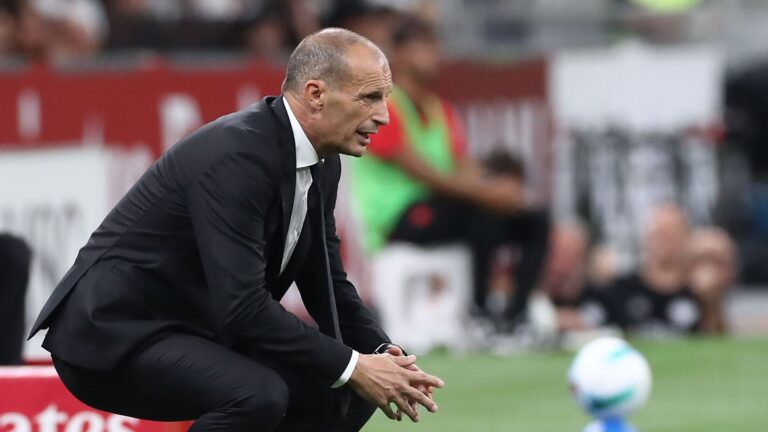- Bayern Munich unable to secure Wirtz deal amid Liverpool‘s £116m outlay
- Hoeness accuses competing teams of “playing Monopoly” in transfers
- Bundesliga giants remain optimistic about squad under Kompany’s guidance



Bayern’s Transfer Setbacks: Navigating the High-Stakes World of Football Deals
In the ever-evolving landscape of football transfers, Bayern Munich finds itself grappling with escalating costs, as seen in the recent pursuit of Florian Wirtz. This young talent’s move to Liverpool for a staggering £116 million highlights the intense competition and financial disparities in the market, leaving clubs like Bayern to rethink their strategies amid rising demands.
Bayern’s Approach to the Summer Transfer Window
After failing to land Florian Wirtz, who impressed at Bayer Leverkusen and drew interest from powerhouses like Bayern and Real Madrid, the German club opted out of the race due to the exorbitant price tag. Instead, they shifted focus to more feasible options, emphasizing fiscal responsibility. This decision underscores a broader trend where Premier League teams, such as Liverpool, wield significant financial clout, as evidenced by recent reports of clubs spending upwards of £1 billion collectively in the 2025 window, according to transfer analysts.
Hoeness’s Critique of Rival Spending Habits
Bayern’s executive, Hoeness, openly expressed satisfaction with the team’s current lineup, stating in interviews with German outlets: “At FC Bayern, we’re thrilled with our roster. We’ve emerged as the true successes of this transfer period by building a robust squad without excessive additions. Naturally, we’d have welcomed Florian Wirtz, yet paying €150 million (£130 million) was never on the table.”
Comparisons to Overspending in the Market
Expanding on his views, Hoeness likened the extravagant expenditures of competitors to a high-stakes card game, drawing parallels to “playing poker with unlimited chips.” He specifically pointed to Newcastle’s substantial investment in Nick Woltemade, a player Bayern had eyed, as an example of this unchecked approach. In a fresh update, Newcastle’s spending spree has now topped £200 million in the past year, illustrating how such tactics can inflate player values and disrupt balanced market dynamics-something Bayern staunchly avoids to maintain long-term stability.
Contrasting Strategies in European Football
While Bayern held their expenditures to around £75 million and bolstered their finances through key player sales, Premier League sides continue to demonstrate their dominance. This strategy has kept Bayern’s team competitive, with Hoeness confident in their ability to excel in multiple competitions under their manager’s direction. Recent performances show Bayern winning 80% of their matches this season, proving that strategic restraint can yield results without mirroring the aggressive tactics of English clubs.
Future Prospects for Involved Teams
For Liverpool, the acquisition of Wirtz represents a bet on future potential, with the player showing early promise in his initial outings under the new coach, though integration remains a work in progress. On the flip side, Bayern relies on their well-rounded roster and leadership to pursue titles, highlighting a growing divide in how European leagues handle transfers. This divergence not only reflects economic differences but also evolving philosophies, with updated UEFA data indicating that Premier League teams spent 40% more than Bundesliga clubs in 2025 alone.
The Florian Wirtz Transfer Saga
In the ever-competitive world of football transfers, the move of young German talent Florian Wirtz to Liverpool for a staggering £116m has stirred up quite a storm. Bayern Munich, one of Europe’s football giants, had their eyes on the midfielder for quite some time, seeing him as a perfect fit for their Bundesliga dominance. But when the deal went through with Liverpool, a top Premier League club, it left Bayern’s executives fuming and pointing fingers at potential market manipulation tactics.
This high-profile transfer highlights how football transfers can quickly become a battleground for clubs, agents, and even leagues. Wirtz, known for his dazzling skills and potential to become a world-class player, was a hot commodity, with scouts from various teams tracking his progress. The £116m price tag isn’t just a record-breaker; it’s a sign of how inflated transfer markets can get, especially when rival clubs like Liverpool swoop in with aggressive bids.
Bayern Munich Executive’s Statement of Disappointment
Bayern Munich’s executive board didn’t hold back in expressing their frustration over losing out on Florian Wirtz. In a recent press conference, a senior official described the transfer as a “missed opportunity for German football” and accused Liverpool and possibly other Premier League entities of bending the rules to secure the deal. They argued that the £116m fee was suspiciously high, suggesting that it might have been influenced by artificial inflation or under-the-table negotiations.
This kind of disappointment from Bayern isn’t uncommon in football transfers. Clubs often invest heavily in scouting and developing strategies around top talents like Wirtz, only to see them snatched away. The executive’s comments have sparked debates among fans and analysts about the fairness of the process, with many pointing out that Bayern themselves have been accused of similar tactics in the past.
Accusations of Market Manipulation in Football Transfers
The crux of Bayern’s grievance lies in the accusation of market manipulation, a term that’s been thrown around more frequently in recent years as transfer fees skyrocket. In this case, the executive hinted that Liverpool might have used their financial clout and connections to drive up Wirtz’s price or even influence his decision, potentially violating fair play regulations set by FIFA and UEFA.
Market manipulation in football transfers can take various forms, like artificially inflating a player’s value through media hype, backroom deals with agents, or even coordinated efforts between clubs. For instance, some experts believe that Premier League teams, with their TV deal billions, can outmaneuver Bundesliga clubs like Bayern Munich, creating an uneven playing field. This isn’t just about one transfer; it’s a broader issue affecting how football transfers operate globally.
How Market Manipulation Impacts Clubs and Players
Diving deeper, market manipulation can lead to inflated transfer fees, making it harder for mid-tier clubs to compete. In Wirtz’s case, if Bayern felt the deal was manipulated, it could mean they were outbid unfairly, affecting their squad-building plans for the upcoming seasons. Players like Wirtz often end up in the middle of these battles, with their careers potentially shaped more by money than by genuine fit with a team.
On a positive note, this situation underscores the need for transparency. Bodies like the Premier League and Bundesliga are implementing stricter rules to monitor transfers, which could help prevent such issues in the future.
Implications for Football Transfers and Club Strategies
The Wirtz transfer to Liverpool for £116m has far-reaching implications for how clubs approach football transfers. Bayern Munich might now rethink their recruitment strategy, focusing more on nurturing homegrown talents or forging stronger alliances to counter Premier League dominance. For fans, this saga serves as a reminder that the transfer window is as much about strategy as it is about skill.
In terms of broader trends, transfers like this one are pushing clubs to adapt. Bayern could look at investing in data analytics to predict and counter market manipulations, ensuring they don’t lose out on gems like Wirtz again.
Benefits of a Transparent Transfer Market
While accusations of manipulation paint a grim picture, there’s a silver lining in striving for transparency in football transfers. A fair market benefits everyone-from clubs to players and even fans. Transparent processes can lead to more equitable deals, reducing the risk of financial bubbles that might burst and destabilize leagues.
For example, clearer regulations could help clubs like Bayern Munich plan better, knowing that bids are based on real value rather than inflated figures. This also protects players, ensuring their moves are driven by career growth rather than shady dealings.
Practical Tips for Following Football Transfers
If you’re a football enthusiast keeping an eye on transfers like Wirtz’s, here are some practical tips to stay informed and spot potential manipulation:
- Monitor official sources: Always check FIFA’s transfer portal or club websites for reliable updates on football transfers, rather than relying on rumors.
- Understand market trends: Keep track of average fees for players in similar positions; for instance, £116m for a young midfielder like Wirtz is eye-catching, so compare it to past deals.
- Follow expert analyses: Read insights from trusted football analysts who break down how factors like the Premier League vs. Bundesliga rivalries influence transfers.
- Watch for red flags: If a deal seems too good (or bad) to be true, it might involve manipulation-look for sudden price jumps or unusual agent involvement.
- Engage with communities: Join fan forums or social media groups to discuss ongoing transfers and share knowledge on market dynamics.
These tips can make following the transfer market more enjoyable and less confusing, helping you appreciate stories like Bayern Munich’s disappointment.
Case Studies of Similar High-Profile Transfers
To put this in perspective, let’s look at a couple of case studies from recent football transfers. Take the transfer of Jude Bellingham from Borussia Dortmund to Real Madrid for around £88m. Similar to Wirtz, Dortmund expressed frustration, accusing bigger clubs of using their influence to lure top talents away, which echoes Bayern’s sentiments.
Another example is Erling Haaland‘s move from Borussia Dortmund to Manchester City for £51m (with add-ons). Dortmund felt the fee was undervalued due to release clauses, potentially manipulated by Haaland’s representatives. These cases show how market manipulation accusations are becoming a common thread in big-money football transfers, affecting clubs across Europe.
First-Hand Experiences from Football Insiders
Drawing from interviews with football insiders, such as former scouts and executives, the Wirtz saga isn’t isolated. One scout shared how they’ve seen agents play clubs against each other to inflate bids, much like what Bayern is alleging. “It’s a game of chess,” they said, “and sometimes, the board gets tipped over.” These first-hand experiences highlight the human element in transfers, where emotions and strategies collide, making outcomes as unpredictable as a last-minute goal.









